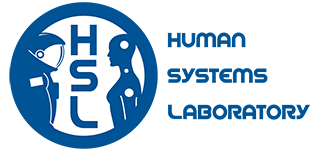The Human Systems Laboratory (HSL) at the Massachusetts Institute of Technology is a research group within the MIT Department of Aeronautics and Astronautics. The lab was originally founded in 1962 as the Man Vehicle Lab (MVL) and was renamed in 2018. HSL performs research to improve the understanding of human physiological and cognitive capabilities to optimize human-system effectiveness and to develop appropriate countermeasures and evidence-based engineering design criteria.
Research is interdisciplinary, using techniques from biomechanics, sensory-motor physiology, human performance assessment, human factors engineering, signal processing, artificial intelligence, and biostatistics. These methods are applied to space suit and exoskeleton design, wearable and virtual/augmented reality technologies, planetary mission resource utilization, space teleoperation, astronaut and pilot disorientation, artificial gravity, automation/autonomy, human-system task modelling, and display and control design. Systems evaluated include exoskeletons, aircraft, spacecraft, and vehicles.
HSL faculty and students have flown experiments on parabolic flight, numerous Space Shuttle missions, the Russian MIR station, and the International Space Station (ISS); founded and led the National Space Biomedical Research Institute; and are helping NASA’s Human Research Program develop biomedical countermeasures for ISS as well as participating in various planetary science missions (e.g., the MOXIE experiment on Mars 2020).
Students have joined the lab from the Department of Aeronautics and Astronautics, Department of Electrical Engineering and Computer Science, Department of Mechanical Engineering, the Harvard-MIT Division of Health Science and Technology, and the MIT Technology and Policy Program.
On September 14, 2012, the HSL celebrated its 50th anniversary with a one-day symposium featuring alumni and current students. More information about the festivities are available in the MIT News Office press release and MVL@50 page on the HSL web site.
